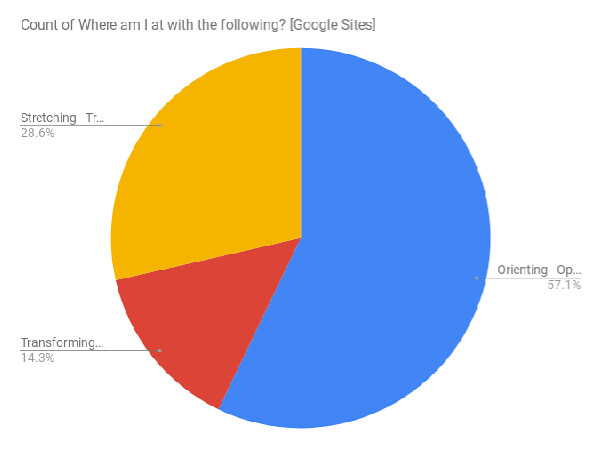I was recently involved in conversation online in regards to re-imagining the conference experience. There were so many points made, such as:
- Provide multiple opportunities to practice and experience new skills.
- Focus on practical techniques and take-aways.
- Create conditions for collaboration and relationship building.
- Accelerate ongoing learning and professional dialogue
- Allow teachers to engage in different elements of choice, action and design.
- Centre around a transformative statement.
All in all, the focus was on the conference and the time afterwards, yet it left me wondering about the time before and what can be done to start the conversation beforehand?
When I think about sessions I have run, I usually start by doing a temperature check of those in the room. This provides attendees with an opportunity to think about their own context and provides me with an insight.

Even though I consider myself flexible, personalising my presentation dependent on the needs in the room, too often the overall structure is set.
I wonder then if there is a possibility to engage people before the day? Peter DeWitt talks about flipping staff meetings, is there a potential to flip the conference experience? Some conferences encourage presenters to create short videos to fit the constraints of various social media platforms. For example, I made this short video for Digicon last year:
Another alternative to providing people with a taste of what to expect is via a podcast. This is something that both Domains17 and Digicon have done lately. Recording interviews with various keynotes and guest presenters. However, these creations usually focus on promotion. (Although I must say, the interviews for Domains17 were quite informative.)
Based on the fact that conferences usually have a cut-off date to accepting people, what if attendees were sent some sort of correspondence containing some sort of provocation, such as a video or a short podcast, as well as a questionnaire to start the dialogue?
Fine we plan with a problem in mind, but to truly develop any understanding of the ‘archetypal customer’ there needs to be some sort of data and feedback. I recognise that this would be a change from the way things are done now, that not everyone will respond, but wouldn’t a few responses be better than we have now, which is no response at all?
Building on Ewan McIntosh’s idea of a pre-mortem,
A period of safe reflection to consider all the potential causes for the future death of our idea and give us a chance to take some preventative measures to alter our ideas, and make them more likely to thrive in the real world.
Asking questions before the conference allows a kind of pretotyping, where the focus can be on the right ‘it’.
In regards to those conferences where attendees vote with their feet, then this dialogue could simply be around a transformational statement that drives the conference. A summary of this information could then be provided to the presenters.
In Thomas Guskey’s evaluation of professional development, he provides five critical levels:
- Participants’ Reaction
- Participants’ Learning
- Organisation Support and Change
- Participants Use of New Knowledge and Skills
- Student Learning Outcomes
Starting the conversation earlier provides an opportunity for participants to identify their own desired outcomes beforehand. In many respects, this process can go beyond conferences and has the potential to develop professional development at all levels. See for example the way in which the #educoachOC chat team provide a post before each chat as a means of starting the conversation before the chat.
So what about you? What strategies have you used to engage learners early to help guide the process? Where do you see this process being a problem? As always, comments welcome.
If you enjoy what you read here, feel free to sign up for my monthly newsletter to catch up on all things learning, edtech and storytelling.
Starting the Learning Before the Conference by Aaron Davis is licensed under a Creative Commons Attribution-ShareAlike 4.0 International License.

Hello Aaron. As usual, this post is timely and informative. I have several presentations in process. I agree with sharing slides or blog post in advance of the conference presentation. I make it a practice to share a backchannel option early in a session so attendees can post questions. Many questions will be answered during the conversation, others can be specifically addressed during the closing remarks. It’s OK if there are unanswered questions, a hashtag or some other connecting strategy can be used to keep the conversation going. Deep dives are difficult to accomplish in 50 – 60 minutes, but if the conversation can continue beyond the session, there are opportunites for deeper, personalized learning. Good luck with your presentations, I will be on the lookout for your support materials.
Bob
Philippa Nicoll Antipas explores how we might do a conference for teacher professional learning and development (PLD) differently. She argues that we need to breakaway from “somebody deciding to share what they’re interested in, in the hope that you’ll find it interesting too.” A review of the literature highlighted that too few decide for too many, in response she came up with a different model where teachers design their own conferences based on their own needs. This model came in the format of a board game-like collective activity.
The process is as important as product.
This reminds me of a piece from Sean Michael Morris reflecting on education conferences.
people make conferences, as well as my wonderings about starting the learning prior to the conference.